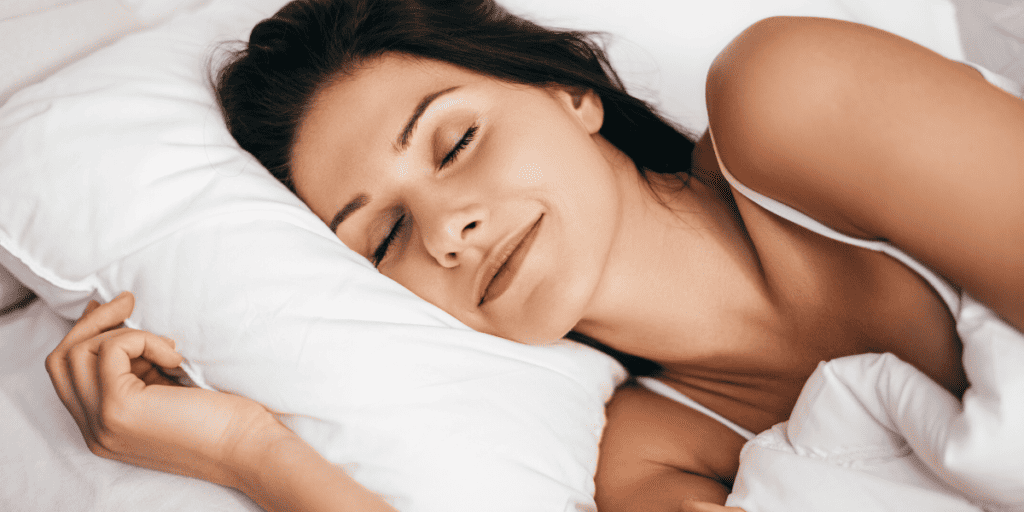
Are you getting enough quality sleep?
How much sleep should you get?
What are the different stages of sleep and are they important?
Why do I wake up tired after a full nights sleep?
Keep reading for:
- answers to these questions
- tips on how you can get a better nights sleep
- small changes you can make to feel more energized when you wake up.
Sleep is so incredibly important. This is when our body repairs itself. Quality sleep protects our physical and mental health.
How we feel when we are awake is directly correlated to how well we sleep.
Our bodies are all different and therefore how much sleep we need will vary. I always wonder though when someone says they only need 4 hours of sleep per night.
That may be true. I wonder…
Are you getting enough quality sleep? How many hours do you need?
Let’s start with how many hours of sleep most of us adults need per night.
While the required number of hours of sleep will vary by individual, most healthy adults need 7 – 9 hours of sleep.
I'm getting 7 - 9 hours of sleep, but I wake up tired.
Are you getting 7 – 9 hours of sleep and still waking up tired?
Well, that could mean a lot of things.
What I found for me is that when I don’t get quality sleep, I wake up feeling tired and dragging. Being in bed for 8 hours isn’t the same as getting 8 hours of quality sleep.
And, as always, be sure to consult your doctor as there could always be health issues that are impacting your sleep.
How do you know if you're getting quality sleep?
It’s not a perfect science, but I really like using a sleep tracker. There are a variety of them on the market. I personally have a Fitbit watch so that is what I’m using.
Most of the sleep trackers will give you a sleep score which gives you at least an indication (they aren’t perfect) of how well you slept.
My Fitbit also gives me an indication of how much time I spent in each stage of sleep, which I find very helpful. The most critical sleep stage is deep sleep.
What are the impacts of not getting enough quality sleep?
- memory issues
- weakened immunity
- mood swings
- trouble concentrating
- high blood pressure
- weight gain
- risk of heart disease
- poor balance
- early aging
What are the stages of sleep?
I’m not a doctor or a sleep expert. I’m sharing what I’ve learned from my own personal research.
There are 5 stages (stages 3 and 4 are often combined) of sleep.
I’ll briefly explain the basics of each stage and which one is perhaps, most important.
What occurs during Stage 1?
Stage 1 occurs as you are starting to fall asleep. This is the very beginning of the sleep cycle and you are in a very light sleep.
At risk of stating the obvious… your eyes are closed. This stage may only last 5 – 10 minutes and if you wake during this stage you may feel like you have not slept at all.
What happens during Stage 2?
In stage 2, you are still drifting off to sleep. This is the stage where your breathing and heart beat slow down, your musles relax and your body temperature decreases.
Your body is preparing for deeper sleep.
Perhaps the most critical of all... Stage 3 and Stage 4
Stages 3 and 4 are deep sleep. According to Webmd.com, this is when the body is repairing tissues, building muscle and bones and strengthens our immune system.
It is during this stage that our memories are consolidated. Individuals with insomnia often experience imparied memory.
This is also when it is most difficult to wake someone.
This was a big ah ha moment for me. I’ve been known to sleep through a phone ringing, literally next to my bed. Although, annoying to the person trying to call me, I now know I must have been in a “deep sleep” stage.
Per Healthline.com, we need approx 1 – 2 hours of deep sleep per night.
Do you dream at night?
Stage 5, or also known as REM (rapid eye movement) is when we are most likely to dream.
Interesting fact: When we are dreaming, our arms and legs are temporarily paralyzed to keep us from acting out our dreams.
How can you get more deep sleep?
- Create a night-time ritual and regular sleep hours
- Reduce stress
- Eat a healthy diet
- Exercise (but not too close to bed time)
- Sleep in a cool room
- Block out light
- Avoid caffeine late in day
- Take time to relax prior to sleep
- Minimize bluelight an hour before sleep
As you explore your healthy living lifestyle, consider joining our free Facebook community. I share tips on healthy eating, exercise, motivation as well as share my personal healthy living journey.
Pin it now. Read later.

